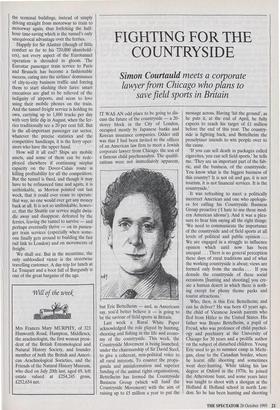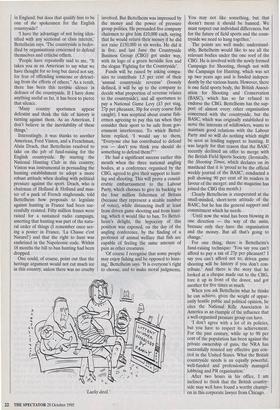FIGHTING FOR THE COUNTRYSIDE
Simon Courtauld meets a corporate
lawyer from Chicago who plans to save field sports in Britain
IT WAS AN odd place to be going to dis- cuss the future of the countryside — a 20- storey block in the City of London, occupied mostly by Japanese banks and Korean insurance companies. Odder still was that I had been invited to the offices of an American law firm to meet a Jewish corporate lawyer from Chicago, the son of a famous child psychoanalyst. The qualifi- cations were not immediately apparent, but Eric Bettelheim — and, as Americans say, you'd better believe it — is going to be the saviour of field sports in Britain.
Last week a Rural White Paper acknowledged the role played by hunting, shooting and fishing in the life and econo- my of the countryside. This week, the Countryside Movement is being launched, under the chairmanship of Sir David Steel, to give a coherent, non-political voice to all rural interests. To counter the propa- ganda and misinformation and superior funding of the animal rights organisations, Bettelheim has formed the Countryside Business Group (which will fund the Countryside Movement) with the aim of raising up to £5 million a year to put the message across. Having 'hit the ground', as he puts it, at the end of April, he fully expects to reach his target of £1 million before the end of this year. The country- side is fighting back, and Bettelheim the proselytiser intends to win people over to the cause.
`If you can sell death in packages called cigarettes, you can sell field sports,' he tells me. 'They are an important part of the fab- ric, and the business, of the countryside. You know what is the biggest business of this country? It is not oil and gas, it is not tourism, it is not financial services. It is the countryside.'
It was refreshing to meet a politically incorrect American and one who apologis- es for calling his Countryside Business Group proactive CI hate to use these mod- ern American idioms'). And it was a plea- sure to hear him saying all the right things: `We need to communicate the importance of the countryside and of field sports at all levels of political and public opinion . . . We are engaged in a struggle to influence opinion which until now has been unequal . . . There is no general perception these days of rural traditions and of what the working countryside is about; views are formed only from the media . . . If you denude the countryside of these social occasions [hunting and shooting] you cre- ate a human desert in which there is noth- ing except for phony theme parks and tourist attractions.'
Who, then, is this Eric Bettelheim; and can he deliver? He was born 43 years ago, the child of Viennese Jewish parents who fled from Hitler to the United States. His father was Bruno Bettelheim, a pupil of Freud, who was professor of child psychol- ogy and psychiatry at the University of Chicago for 30 years and a prolific author on the subject of disturbed children. Young Eric used to go to summer camp in Michi- gan, close to the Canadian border, where he learnt rifle shooting and sometimes went deer-hunting. While taking his law degree at Oxford in the 1970s, he joined the Atherstone hunt, and some years later was taught to shoot with a shotgun at the Holland & Holland school in north Lon- don. So he has been hunting and shooting in England; but does that qualify him to be one of the spokesmen for the English countryside?
`I have the advantage of not being iden- tified with any sectional or class interest,' Bettelheim says. `The countryside is bedev- illed by organisations concerned to defend themselves and criticise others.
`People have repeatedly said to me, "It takes you as an American to say what we have thought for so long but dared not say, for fear of offending someone or detract- ing from the efforts of others." As a result, there has been this terrible silence in defence of the countryside. If I have done anything useful so far, it has been to pierce that silence.
`Many country sportsmen appear defeatist and think the tide of history is turning against them. As an American, I don't believe in the inevitability of these things.'
Interestingly, it was thanks to another American, Fred Vinton, and a Frenchman, Main Drach, that Bettelheim resolved to take on the job of fund-raising for the English countryside. By starting the National Hunting Club in this country, Vinton was instrumental in persuading the hunting establishment to adopt a more robust attitude when dealing with political pressure against the sport. Drach, who is chairman of Holland & Holland and mas- ter of a pack of French staghounds, told Bettelheim how proposals to legislate against hunting in France had been suc- cessfully resisted. Fifty million francs were raised for a sustained radio campaign, asserting that hunting was part of the natu- ral order of things (I remember once see- ing a poster in France, `La Chasse c'est Naturel') and that the right to hunt was enshrined in the Napoleonic code. Within 18 months the bill to ban hunting had been dropped.
One could, of course, point out that the heritage argument would not cut much ice in this country, unless there was no cruelty involved. But Bettelheim was impressed by the money and the power of pressure group politics. He persuaded five company chairmen to give him £10,000 each, saying that he would return their money if he did not raise £150,000 in six weeks. He did it in five, and last June the Countryside Business Group (CBG) got under way, with its logo of a green heraldic lion and the slogan 'Fighting for the Countryside'.
Funds will be raised by asking compa- nies to contribute 1.5 per cent of their `annual countryside revenue' (loosely defined, it will be up to the company to decide what proportion of revenue relates to the countryside), and all sportsmen to pay a National Game Levy (£3 per stag, 27p per pheasant, 30p for every coarse fish caught). I was sceptical about coarse fish- ermen agreeing to pay this tax when they consider their sport to be safe from gov- ernment interference. To which Bettel- heim replied, `I would say to them, "Everyone else has contributed to defend you — don't you think you should do something to defend them?"' He had a significant success earlier this month when the three national angling bodies, at a conference organised by the CBG, agreed to give their support to hunt- ing and shooting. This will prove a consid- erable embarrassment to the Labour Party, which chooses to give its backing to the four million fishermen of Britain (because they represent a sizable number of votes), while distancing itself at least from driven game shooting and from hunt- ing, which it would like to ban. To Bettel- heim's delight, the hypocrisy of this position was exposed, on the day of the angling conference, by the finding of a professor of animal welfare that fish are capable of feeling the same amount of pain as other creatures.
`Of course I recognise that some people may enjoy fishing and be opposed to hunt- ing,' Bettelheim says. 'It is everyone's right to choose, and to make moral judgments.
`Lucky devil.' You may not like something, but that doesn't mean it should be banned. We must respect our individual differences, but for the future of field sports and the coun- tryside we need to hang together.'
The points are well made; understand- ably, Bettelheim would like to see all the relevant bodies under the one roof of the CBG. He is involved with the newly formed Campaign for Shooting, though not with the Campaign for Hunting, which was set up two years ago and is funded indepen- dently by the various hunts. However, there is one field sports body, the British Associ- ation for Shooting and Conservation (BASC), which has so far refused to endorse the CBG. Bettelheim has the sup- port of almost every other organisation concerned with the countryside, but the BASC, which was originally established to serve the interests of wildfowlers, wants to maintain good relations with the Labour Party and so will do nothing which might be seen as lending support to hunting. It was largely for that reason that the BASC recently declined an offer to merge with the British Field Sports Society. (Ironically, the Shooting Times, which declares on its masthead that it is 'proud to be the official weekly journal of the BASC', conducted a poll showing 90 per cent of its readers in favour of the merger; and the magazine has joined the CBG this month.) Clearly Bettelheim is exasperated at the small-minded, short-term attitude of the BASC, but he has the general support and commitment which he needs.
`Until now the wind has been blowing in one direction — the way of the antis, because only they have the organisation and the money. But all that's going to change.'
For one thing, there is Bettelheim's fund-raising technique: 'You say you can't afford to pay a tax of 27p per pheasant? I say you can't afford not to; driven game shooting will be history if you don't con- tribute.' And there is the story that he looked at a cheque made out to the CBG, tore it up in front of the donor, and got another for five times as much.
When you ask Bettelheim what he thinks he can achieve, given the weight of appar- ently hostile public and political opinion, he cites the National Rifle Association in America as an example of the influence that a well-organised pressure group can have.
`I don't agree with a lot of its policies, but you have to respect its achievement. For the past century, while up to 90 per cent of the population has been against the private ownership of guns, the NRA has successfully resisted any effective gun con- trol in the United States. What the British countryside needs is an equally powerful, well-funded and professionally managed lobbying and PR organisation.'
After two hours in his office, I am inclined to think that the British country- side may well have found a worthy champi- on in this corporate lawyer from Chicago.



































































 Previous page
Previous page